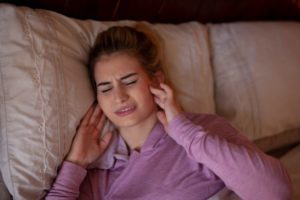
Do you often suffer from jaw pain? Do you frequently feel exhausted, even in the middle of the day? Has your spouse informed you that you snore at night? If you answered yes to those questions, it is possible that you are suffering from both TMJ and sleep apnea in Denver. Together, these conditions can negatively affect your quality of life and endanger your long-term wellness. This blog post discusses the connection between them and how you may be able to find relief.
Defining TMJ Disorder and Sleep Apnea
Your TMJ is the joint that connects your lower jaw to the rest of your skull. TMJ disorder, often referred to as TMD, can encompass any number of problems that afflict this delicate and important joint. When the TMJ endures stress or injury, you are likely to experience a range of symptoms, such as jaw pain, facial soreness, headaches, body aches, difficulty chewing, and more.
Obstructive sleep apnea (OSA) is a separate condition characterized by multiple pauses in breathing throughout the night, which may occur dozens or even hundreds of times. The pauses happen because tissues in the throat block the free flow of oxygen. Common symptoms of OSA include daytime exhaustion, mood swings, trouble concentrating, and loud snoring.
The Correlation Between TMD and OSA
Numerous studies have indicated a correlation between OSA and TMD. For example, research conducted in 2013 found that both women and men who showed at least two signs or symptoms of OSA were 73% more likely than general population to experience first-time TMD. Another study even noted that chronic TMD occurred three times as frequently in individuals with a high likelihood of developing OSA.
How Are TMD and Sleep Apnea Connected?
Here are a few possible explanations for why there is such a strong association between TMD and OSA:
- Common risk factors. Some issues with oral anatomy, such as poor bite alignment, can lead to a narrow airway while simultaneously placing excess stress on the TMJ.
- Poor jaw positioning contributes to OSA. Individuals with TMD common have a lower jaw that rests farther back than it should. This positioning can play a role in airway problems, particularly at night.
- OSA may worsen TMD. When you stop breathing during an OSA episode, your body goes into panic mode. This leads to muscle tension, which can adversely affect the sensitive TMJ.
Finding Relief
TMD is a complex condition, and there is no universal solution for it. However, many patients have discovered that OSA treatment helps them to sleep better and experience a reduction in TMD symptoms. This is often the case among people whose TMD stems from muscular tension in the face. Additionally, some OSA treatments, such as those that involve the use of an oral appliance from a sleep dentist, also prevent bruxism (teeth grinding), which is a common contributor to TMD.
OSA and TMD are both serious problems. If you suffer from one or both of these conditions, professional treatment may be able to bring you lasting relief.
Meet the Practice
Drs. Glenn Thompson and Gary Radz have personally suffered from OSA, so they have special empathy for the patients who come into our practice. If you are concerned about the quality of your sleep, our team is ready to serve you. Contact us at 303-377-5337.